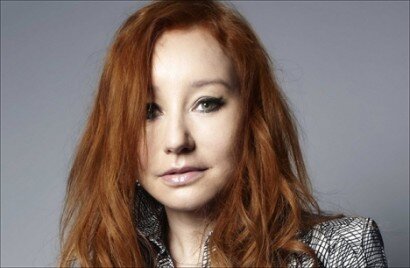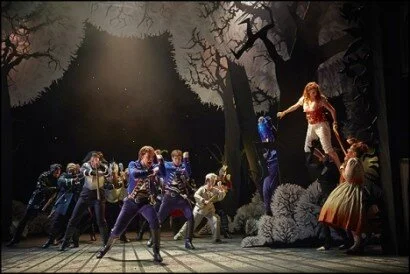"I Feel Her In My Bones," Says Tori Amos of Writing a New Rebellious Heroine in a Violently Contemporary World
Originally published on Playbill.com
View this story online
"The idea of writing a G-rated piece…I'm not sure if I'm the woman for the job!" laughed Tori Amos.
Few would disagree with Amos' statement. The singer-songwriter and composer, who has received eight Grammy nominations over the course of her multi-faceted career, has demonstrated an independent streak and rebellious tendencies from almost the first moment she sat down at a piano.
Six years after being admitted to the Peabody Institute at Johns Hopkins University at the age of five — the youngest person ever to have been admitted — Amos was expelled for her interest in pop and rock music and refusal to sight read. ("They were trying to drum theory into me, while I was dreaming of running away with John Lennon," she recalled.)
Her devotion to independence and her refusal to compromise her artistic values have followed Amos throughout her career; this is clearly evident in the music she composed for The Light Princess, the new musical that played London's National Theatre in September 2013, featuring music and lyrics by Amos and a book and lyrics by Samuel Adamson (All About My Mother, Mrs. Affleck).
"I feel her deeply in my bones," Amos said of Althea, the title character of the new adaptation of the George MacDonald fairy tale. Unable to cope with the death of her mother, Althea loses her gravity and her ability to cry. Struggling to connect to her distant father, Althea refuses to accept role the of Queen of her country and an arranged marriage, fleeing into the woods.
"She's cursed in the original story. It really isn't until the end of the story when she loses love that she becomes clear about what she wants from life," Adamson said of Althea, who, in the musical, spent a childhood stuck in a tower, educating herself with books left to her by her mother. "We felt we wanted to have a character who was much more active than that and who, earlier in her journey, began to have sense of what it was that she wanted and also what it was that she needs. She's quite a headstrong character."
"I feel like a lot of teenagers that saw it, and not just teenagers, related to her and her circumstance — the idea that she wasn't accepted and that a lot of people around her were demanding her to change," Amos said. Elaborating on the connection between her personal life and her art, she added, "It's no secret that my father and I weren't always singing from the same hymn sheet all the time."
It was Amos' family — her nieces and nephews as well as her own daughter — who influenced her desire to write the music for The Light Princess, which she described as a production that honors their emotional experiences in the 21st century.
"I wanted it to be part of a fairytale, however, one that really tackled issues that teenagers are dealing with now, and certain dark issues, specifically… I feel like musicals can tackle some really tough issues, and I think it's exciting when you can bring magic along with darkness and empower people to look at certain things in their lives that they need to confront."
"We wanted to stay true to the fairytale genre. We weren't particularly interested in sending up or ironizing that genre," Adamson said. "We wanted to sincerely start with the words, 'Once Upon a Time,' but we wanted to write a piece that was kind of violently contemporary."
Often seen as a feminist role model in the music industry — her album "Strange Little Girls" features her singing songs written by men but performed from a woman's perspective — Amos also appreciated the storyline of Althea denying the typical course of action for a young woman in a royal family: "We're in a world, of course, that's questioning the patriarchy, and I think [Althea] really has been treated irresponsibly, so we wanted to investigate consequences to choices and how she has to face the consequences. We felt that it was important that everybody has to feel the results of their actions and have a dose of their own medicine."
"That's very much part of Tori's identity, and she has absolutely struck out on her own, compiled her own sorrow, done her own thing," Adamson said. "She has a unique voice, and she's never compromised. And in finding out who she is, Althea does similar strikingly independent things."
Amos' perspective comes from her own experience. Following her artistic and commercial breakthrough with the album "Little Earthquakes," which illustrates her personal background and sexual awakening, Amos worked to establish her independence from record company executives, converting a barn into her own recording studio and negotiating the termination of contracts with record labels in order to work independently by forming her own record label, Transmission Galactic.
"In the music industry, it was very challenging to be successful and not an object, and that was really something that I had to make sure of," she recalled. "People would try in all kinds of ways to make you more appealing. Sometimes it's putting an image on you that is disingenuous, that isn't real, but that they feel would sell more records. I would constantly be making choices that would go against the marketing ideas around me. If you don't do that, then you look back on your career and realize you don't know who you are anymore."
Amos remained true to her artistic values even while recording the two-disc cast album of The Light Princess, which she completed while on tour and described as "one of the crazier things that I've done. I don't know if I recommend it."
The unconventional recording process came about because representatives from Mercury Classics, which is part of Universal Records, had seen the musical at the National Theatre in London — which is a state theatre, not a commercial one. Amos and Adamson still hold the rights to the stage show. Encouraged by Universal Records, the writing team decided to record the album."I thought, 'OK, but we're not doing it how some cast albums have to be made because the stage producers, the commercial producers, are demanding it be done in such a way,'" Amos said. "I thought, 'We're going to roll our sleeves up and dedicate our lives to doing this. This is what we have to do, because that girl in Ohio doesn't know it yet, but she's waiting for this record, and I'm waiting for her to hear it."
As a girl in North Carolina, Amos grew up listening to Rodgers and Hammerstein musicals that were favorites of her mother's, especially Oklahoma! and The Sound of Music. Laughing, she remembered that, as a minister's daughter, she shocked parishioners at her church by loving the songs in Jesus Christ Superstar. ("I was just in love with Judas," she admitted.)
Despite her history with musical theatre, working on The Light Princess introduced Amos to a new kind of writing, after spending the past few decades composing for herself or a band. The key changes that were necessary to make in songs for the actors were a challenge for her.
"It began to be really clear to me that we needed to study the instruments of the actors… I was told there are some composers who just refuse," she said. And you think, 'Well, we have this amazing talent standing in front of us, and this is just out of their range.' It would be very much about making the dress fit the girl, not the girl fitting the dress."
The cast of The Light Princess
Photo by Brinkhoff/Mögenburg
Elaborating on the collaborative aspects of writing for theatre, rather than for oneself, Adamson added, "Coming into the theatre world, [Amos] had to — not change the way she works, necessarily, but she began to collaborate in new ways. She was working very closely with me, and then obviously she was working with lots of other people, and that's very different from what she does in the music world. I think she really, really loved that."
While aspects of The Light Princess differ greatly from those of conventional fairy tales, one of the musical's themes is found in many classic tales: the difficulty of growing up.
"Ultimately, it's a piece about growing up and becoming an adult," Adamson said, "working out who you are and your place in the world and falling in love with all of the glorious mess that means.""It's not easy growing up for everyone," Amos added. "Certain conversations are difficult, and sometimes you can really believe there's no way out of a situation. And there are moments when Althea gets pushed to the brink — the very, very edge of a cliff. She feels that she has to take her own life, and yet she is given a sense of support from nature.
"There's something that I found really beautiful about the relationship she had with nature and the lake, and how it became a spiritual mother for her," she said. "I think it's a really beautiful relationship she has with Mother Earth, with nature — a spiritual relationship that gives her a lot of strength. I really loved that, even though The Light Princess has moments that are so harrowing and dark, she still survives those challenges and takes control of her own life and is going to be her own savior."


